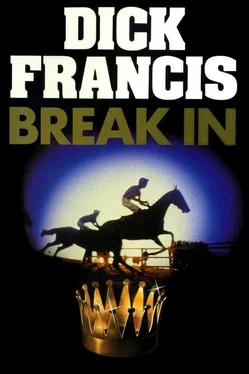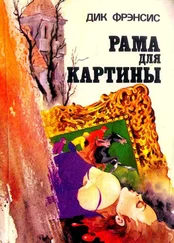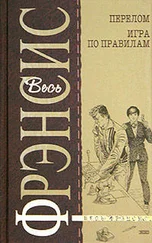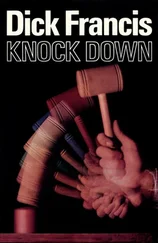Never make positive commitments on race-days...
‘I’ll meet you outside the weighing room, after the fifth, then,’ I said. ‘It’s a good road. We should get to Chiswick in time.’
‘Great,’ she said, and the princess seemed relieved that we could now concentrate on her horse and the immediate future.
‘Kind of you, Kit,’ she said, nodding.
‘Any time.’
‘How do you think my old boy will do today?’
‘He’s got bags of stamina,’ I said. ‘He should run well.’
She smiled. She knew ‘bags of stamina’ was a euphemism for ‘not much finishing speed’. She knew Icicle’s ability as well as I did, but like all owners, she wanted good news from her jockey.
‘Do your best.’
‘Yes,’ I said.
I mounted and took Icicle out on to the track.
To hell with superstition, I thought.
It wasn’t Icicle I had trouble with.
Icicle jumped adequately but without inspiration and ran on doggedly at one pace up the straight, more by good luck than anything else hanging on to finish second.
‘Dear old slowcoach,’ the princess said to him proudly in the unsaddling enclosure, rubbing his nose. ‘What a gentleman you are.’
It was the hurdler afterwards that came to grief: an experienced racer but unintelligent. The one horse slightly ahead and to the right of us hit the top of the second hurdle as he rose to the jump and stumbled on to his nose on landing, and my horse, as if copying, promptly did exactly the same.
As falls went, it wasn’t bad. I rolled like a tumbler on touching the ground, a circus skill learned by every jump jockey, and stayed curled, waiting for all the other runners to pass. As standing up in the middle of a thundering herd was the surest way to get badly injured, staying on the ground, where horses could more easily avoid one, was almost the first lesson in survival. The bad thing about falls near the start of hurdle races, however, was that the horses were going faster than in steeplechases, and were often bunched up together, with the result that they tended not to see a fallen rider until they were on top of him, by which time there was nowhere else to put their feet.
I was fairly used to hoof-shaped bruises. In the quiet that came after the buffeting I stood slowly and stiffly up with the makings of a new collection, and found the other fallen jockey doing the same.
‘You all right?’ I said.
‘Yeah. You?’
I nodded. My colleague expressed a few obscene opinions of his former mount and a car came along to pick us up and deliver us to the ambulance room to be checked by the doctor on duty. In the old days jockeys had got away easily with riding with broken bones, but nowadays the medical inspections had intensified to safeguard the interests not altogether of the men injured but of the people who bet on them. Appeasing the punter was priority stuff.
Bruises didn’t count. Doctors never stopped one from riding for those, and in any case bruises weren’t visible when very new. I proved to the local man that all the bits of me that should bend, did, and all the bits that shouldn’t bend, didn’t, and got passed fit to ride again from then on.
One of the two volunteer nurses went to answer a knock on the door and came back slightly bemused to say I was wanted outside by a woman who said she was a princess.
‘Right,’ I said, thanking the doctor and turning to go.
‘Is she?’ the nurse asked dubiously.
‘A princess? Yes. How often do you come to race meetings?’
‘Today’s my first.’
‘She’s been leading owner three times in the past six jumping seasons, and she’s a right darling.’
The young nurse grinned. ‘Makes you sick.’
I went outside to find the right darling looking first worried and then relieved at my reappearance. She was certainly not in the habit of enquiring after my health by waiting around outside ambulance room doors, and of course it wasn’t my actual well-being which mattered at that point, but my being well enough to drive the niece to work.
The niece was also there and also relieved and also looking at her watch. I said I would change into street clothes and be ready shortly, and the princess kissed the niece and patted my arm, and went away saying she would see me at Newbury on the morrow.
I changed, found the niece waiting outside the weighing room, and took her to my car. She was fairly fidgeting with an impatience which slightly abated when she found the car was a Mercedes, but changed to straight anxiety when she saw me wince as I edged into the driving seat.
‘Are you OK? You’re not going to pass out, or anything, are you?’ she said.
‘I shouldn’t think so.’
I started the car and extricated ourselves from the close-packed rows. A few other cars were leaving, but not enough to clog the entrance or the road outside. We would have a clear run, barring accidents.
‘I guess I thought you’d be dead,’ the niece said without emotion. ‘How does anyone survive being trampled that way by a stampede?’
‘Luck,’ I said succinctly.
‘My aunt was sure relieved when you stood up.’
I made an assenting noise in my throat. ‘So was I.’
‘Why do you do it?’ she said.
‘Race?’
‘Uh-huh.’
‘I like it.’
‘Like getting trampled?’
‘No,’ I said. ‘That doesn’t happen all that often.’
We swooped down the hill from the moor and sped unhindered along roads that in the summer were busy with holiday crises. No swaying overloaded caravans being towed that day, no children being sick at the roadside, no radiators boiling and burst, with glum groups on the verges waiting for help. Devon roads in November were bare and fast and led straight to the motorways which should take us to Chiswick with no problems.
‘Tell me truthfully,’ she said, ‘why do you do it?’
I glanced at her face, seeing there a quality of interest suitable for a newsgatherer. She had also large grey eyes, a narrow nose, and a determined mouth. Good-looking in a well-groomed way, I thought.
I had been asked the same question many times by other newsgatherers, and I gave the standard answer.
‘I do it because I was born to it. I was brought up in a racing stable and I can’t remember not being able to ride. I can’t remember not wanting to ride in races.’
She listened with her head on one side and her gaze on my face.
‘I guess I never met a jockey until now,’ she said reflectively. ‘And we don’t have much jump racing in America.’
‘No,’ I agreed. ‘In England there are probably more jump races than Flat. Just as many, anyway.’
‘So why do you do it?’
‘I told you,’ I said.
‘Yeah.’
She turned her head away to look out at the passing fields.
I raced, I thought fancifully, as one might play a violin, making one’s own sort of music from coordinated muscles and intuitive spirit. I raced because the partnership with horses filled my mind with perfections of cadence and rhythmic excitement and intensities of communion: and I couldn’t exactly say aloud such pretentious rubbish.
‘I feel alive,’ I said, ‘on a horse.’
She looked back, faintly smiling. ‘My aunt says you read their thoughts.’
‘Everyone close to horses does that.’
‘But some more than others?’
‘I don’t really know.’
She nodded. ‘That makes sense. My aunt says you read the thoughts of people also.’
I glanced at her briefly. ‘Your aunt seems to have said a lot.’
‘My aunt,’ she said neutrally, ‘wanted me to understand, I think, that if I went in your car I should arrive unmolested.’
‘Good God.’
‘She was right, I see.’
Читать дальше




